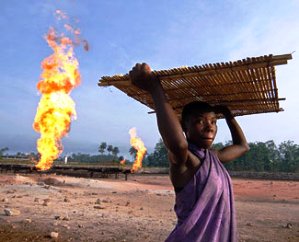South Africa
South Africa: Strike ends, workers' anger remains

* * * STOP PRESS* * *
On September 6, the major trade unions representing South Africa's 1.3 million public servants and teachers announced that the 20-day strike for higher wages and allowances had been "suspended". See union statements below. Union leaders said the move would allow members to consider the latest government offer. Public servants went on strike demanding an 8.6% pay rise, while the government has offered 7.5%. According to the BBC, workers who came to hear union officials shouted in protest when they
announced that the strike was being suspended. Meanwhile, workers in many other industries are taking or threatening industrial action.
* * *
By Terry Bell, Cape Town
South Africa: COSATU's Zwelinzima Vavi's Ruth First Memorial Lecture

Is Africa still being looted? World Bank dodges its own research

By Patrick Bond
August 15, 2010 – The continent’s own elites, together with the West and now China, are still making Africans progressively poorer, thanks to the extraction of raw materials. Reinvestment is negligible and the prices, royalties and taxes paid are inadequate to compensate the wasting away of Africa’s natural wealth. Anti-extraction campaigns by (un)civil society are the only hope for a reversal of these neocolonial relations.
Though it’s easy to prove, even using the World Bank’s main study of natural resource economics, the looting allegation is controversial. When I made it during a Canadian Broadcasting Corporation (CBC) interview last week, the World Bank’s chief economist for Africa Shanta Devarajan, immediately contradicted me, claiming (twice) that I am not in command of the “facts”.
Why the left should support the boycott of Israel -- a reply to the US Socialist Workers Party

South Africa loses its ‘War on Poverty’

By Patrick Bond, Durban
August 6, 2010 – Shortly before Pretoria’s presidential power change from Thabo Mbeki to Jacob Zuma two years ago, the South African state announced its War on Poverty. What news from the front, in the immediate wake of World Cup host duties that showed observers how very pleasant life is for the rich and middle class here?
We don’t know, because the War on Poverty is one of the most clandestine operations in South African history, with status reports kept confidential by a floundering army in rapid retreat from the poor, who are estimated at half the society.
Initially the War on Poverty appeared as a major national project. Early hubris characterised the war, as happens in most, with victory claimed even before Mbeki officially launched it in his February 2008 State of the Nation speech.
COSATU leader on SACP's 89th anniversary: `Mass power is the best defence'

By Zwelinzima Vavi
August 1, 2010 -- July 29, 2010, marks the 89th anniversary of a revolutionary organ of the working class, the South African Communist Party (SACP).
Being the only communist party in the African continent, the SACP (or Communist Party of South Africa as it was known then) has been a wagon that advanced and carried working-class struggles in the country and also in the continent. The formation of the CPSA is inseparable from the history of the Great October Revolution of 1917 and the launch of the Communist International in 1919.
South African soccer: For the love of the game or of money and power?

By Dale T. McKinley, Johannesburg
July 7, 2010 -- The sun has almost set on the soccer World Cup and its seeming suspension of our South African "normalcy". No doubt, many will try their best to continue to bask in its positively proclaimed "developmental legacy"; but, as sure as the sun will rise on the morning after, so too will the reality of that "normalcy" bite us like an unhappy dog. Nowhere will this be more apparent than in the world of South African soccer itself.
Memperjuangkan Sepakbola: Apakah `permainan sedunia' ini permainan rakyat?
Oleh Duroyan Fertl
5 Juli 2010 -- Berdikari -- Piala Dunia FIFA 2010 di Afrika Selatan telah memulai putaran final 16 besarnya pada 26 Juni. Ia hadir di tengah dengungan terompet vuvuzela yang tak pernah surut, kekalahan tim-tim besar seperti Italia dan Perancis, dan aksi-aksi protes di jalanan oleh warga setempat yang marah atas dana 40 miliar rand yang dibelanjakan pemerintah untuk membiayai acara yang dikelola swasta ini. Sementara itu, kaum miskin Afrika Selatan menderita karena perumahan dan akses layanan mendasar yang di bawah standar.
Sepakbola adalah “permainan dunia” yang dimainkan oleh jutaan orang di seluruh dunia dan ditonton oleh ratusan juta lainnya. Tapi benarkah itu “permainan rakyat”?
Sepakbola itu sendiri seringkali merupakan suatu pertunjukan menegangkan yang menampilkan kepiawaian manusia. Suatu pertandingan sepakbola yang bermutu tinggi dapat dibandingkan dengan seni. Maka tak heran ia begitu populer di seluruh dunia.
South Africa: FIFA forbids free speech at World Cup

By Patrick Bond
July 7, 2010 -- Acting against our alleged "ambush marketing" and "incitement" (sic), the South African Police Service, newly augmented with 40,000 additional cadre for the World Cup, detained several of us here in Durban last weekend. We were simply exercising freedom of expression at our favourite local venue, the South Beach Fan Fest, whose half-million visitors is a record.
Wearing hidden microphones so as to tape discussions with police leadership, what we learned was chilling, for they have received orders from Durban city manager Mike Sutcliffe that the property rights of the world soccer body, the Fédération Internationale de Football Association (FIFA), overrule our foundational constitutional rights.
“We can charge you and detain you until the 11th of July, [when] FIFA is over!”, a top officer shouted at me during my second interrogation, on Saturday, July 3.
